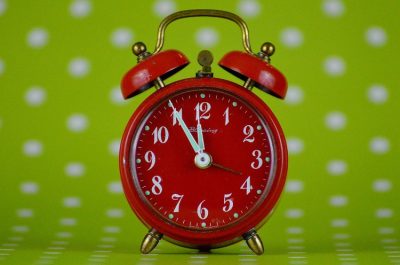In this English grammar lesson, you will learn the difference between the prepositions of time “by” and “until” and how to use them.
As a preposition of time, “by” means before a specific time.
“by” shows a time limit for something to happen.
An event must happen before a specific time is reached.
(I must receive it before Tuesday. The deadline is Tuesday)
Jane would like to lose 3 kg by June.
(She would like to lose 3kg before June.)
We often use “by” for projects with deadlines.
We often use “by” to say when someone will return:
David: She is in London. She’ll be back by Saturday.
“by then”
We use “by then” to describe a specific time that we have already mentioned earlier in the sentence or in a previous sentence.
Tomorrow is the last day of school. You must finish all the exercises by then.
The TV show starts at 9pm so please finish your homework by then.
Preposition of time: “until”

As a preposition of time, “until” describes a continuous action that stops at a specific time.
“until” describes the duration of an action before a specific time.
I’m really tired. Last night I watched a film until midnight.
Mark lived in Manchester until 2010.
“till”
We can use “till” instead of “until“.
“till” is more informal.
I am going to study until 9 o’clock.
Be careful of the spelling:
until
till
From …. until
from + specific time = start time
until + specific time = end time
The shop will be closed from 7pm until 8am tomorrow.
The shop will be closed from 7pm through 8am tomorrow. (USA English)
When NOT to use “until”
We do NOT use “until” to describe numbers or a quantity:
Instead, we use “up to“:
You may take the accounting exam up to 3 times.
The cinema can hold until 100 people. ![]()
The cinema can hold up to 100 people. ![]()
The difference between “by” and “until”
This means that in the present, I am not rich.
I predict that I will be rich before year 2020.
This means that in the present, I am already rich.
I will continue to be rich between now and 2020
After 2020, I will no longer be rich. I will be poor.


david says
now i know that how to use by and until
mahboob says
Dear Sir/mam,
I would like to express my gratitude and words of thanks you and all your colleagues for providing such a valuable information on specific topics of the English.
I also would like to please provide us the videos of the related topics through the below mentioned email or instruct us how to download from your websites to improve my English language skills.
thanks you so much.
Rebeca Ancira says
Hi, I have a question.
Can the sentence “I will be rich until 2020” also mean that I am poor now and I will be poor all the time but in 2020 I will be rich?
Gopal Bhattarai says
I would be grateful if you could answer it. She studied medicine … the age of 25. (by or until)